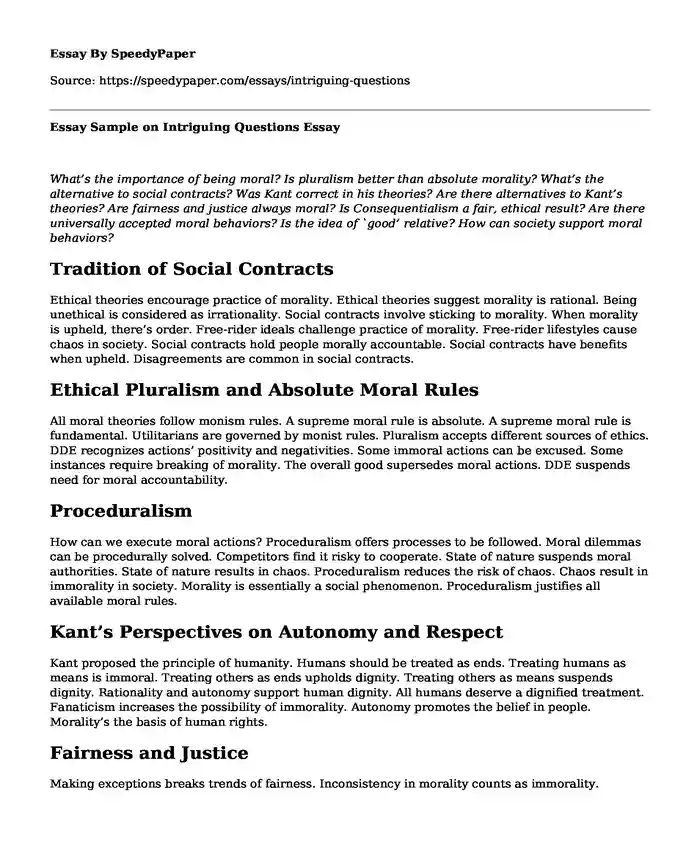
| Essay type: | Creative essays |
| Categories: | Ethics Immanuel Kant Social issue |
| Pages: | 3 |
| Wordcount: | 647 words |
What’s the importance of being moral? Is pluralism better than absolute morality? What’s the alternative to social contracts? Was Kant correct in his theories? Are there alternatives to Kant’s theories? Are fairness and justice always moral? Is Consequentialism a fair, ethical result? Are there universally accepted moral behaviors? Is the idea of `good’ relative? How can society support moral behaviors?
Tradition of Social Contracts
Ethical theories encourage practice of morality. Ethical theories suggest morality is rational. Being unethical is considered as irrationality. Social contracts involve sticking to morality. When morality is upheld, there’s order. Free-rider ideals challenge practice of morality. Free-rider lifestyles cause chaos in society. Social contracts hold people morally accountable. Social contracts have benefits when upheld. Disagreements are common in social contracts.
Ethical Pluralism and Absolute Moral Rules
All moral theories follow monism rules. A supreme moral rule is absolute. A supreme moral rule is fundamental. Utilitarians are governed by monist rules. Pluralism accepts different sources of ethics. DDE recognizes actions’ positivity and negativities. Some immoral actions can be excused. Some instances require breaking of morality. The overall good supersedes moral actions. DDE suspends need for moral accountability.
Proceduralism
How can we execute moral actions? Proceduralism offers processes to be followed. Moral dilemmas can be procedurally solved. Competitors find it risky to cooperate. State of nature suspends moral authorities. State of nature results in chaos. Proceduralism reduces the risk of chaos. Chaos result in immorality in society. Morality is essentially a social phenomenon. Proceduralism justifies all available moral rules.
Kant’s Perspectives on Autonomy and Respect
Kant proposed the principle of humanity. Humans should be treated as ends. Treating humans as means is immoral. Treating others as ends upholds dignity. Treating others as means suspends dignity. Rationality and autonomy support human dignity. All humans deserve a dignified treatment. Fanaticism increases the possibility of immorality. Autonomy promotes the belief in people. Morality’s the basis of human rights.
Fairness and Justice
Making exceptions breaks trends of fairness. Inconsistency in morality counts as immorality. Immoral actions should be treated equally. Inconsistency in justice could cause chaos. The golden rule is morally binding. The golden rule measures morality’s consistency. Kantian theories provided motivation for morality. Maxims justify universalizability of actions. Every action has a reflecting reaction. Moral decisions result in positive reactions.
Consequentialism
John Wesley proposed philosophy of life. We should perform maximum good deeds. Consequentalism promotes doing of good deeds. Acting morally results in good feedbacks. Acting immorally results in negative feedbacks. People need motivation to act morally. Possibility of good results motivates morality. Well-meaning actions may result in negativity. Intentions should be judged, not actions. Utilitarianism promotes the practice of impartiality.
Difficulties in Consequentialism
Utilitarianism promotes Optimific actions in society. Moral actions are judged from results. Harms from actions determine their morality. Creation of balance determines actions’ morality. Utilitarianism is suspended when procedures lack. Pluralism seeks to solve utilitarianism dilemmas. We should maximize possibility of pleasure. However, pleasure should not supersede morality. Utilitarianism is very demanding on morality. Utilitarianism requires deliberation, motivation and action.
Impartiality
Impartiality is important in practicing morality. Happiness doesn’t depend on material possessions. Happiness comes from feelings of fulfillment. Impartiality results in happiness in society. However, morality calls for partiality. Partiality has to be carefully practiced. Priorities will determine partiality or impartiality. Utilitarians are supportive of moral partiality. Impartiality supports altruistic actions in society. Partiality is sometimes viewed as selfish.
Learning Points from the Topics
Morality is paramount in every society. Morality results in order in society. Immorality results in chaos in society. There are many theories of morality. Morality or immorality is individually decided. Moral actions have positively resulting ends. Immoral actions result in negative ends. Morality is relative to the environments. Immorality is excused in some instances. Moral societies have better prosperity prospects.
Cite this page
Essay Sample on Intriguing Questions. (2023, Aug 27). Retrieved from https://speedypaper.com/essays/intriguing-questions
Request Removal
If you are the original author of this essay and no longer wish to have it published on the SpeedyPaper website, please click below to request its removal:
- Free Essay Example on Unemployment as a Social Issue
- Views of John Locke on the Social Contract Theory, Essay Sample in Philosophy
- Paper Example. The Effects of Provincial Cuts on Ontario
- Free Essay Sample on Causes of Modern Slavery
- Essay Sample on Women and Work in Cameroon
- Free Essay Sample: Human Resource Issues.
- La Migra Meaning: A Brief Essay Sample for College Students
Popular categories




